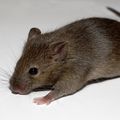Text to go here...
 Scientists have uncovered an intriguing signalling pathway linking cancer and diabetes. Mice with higher levels of the cancer-causing Lin 28 proteins are protected from diabetes and some of the damaging effects of obesity.
Scientists have uncovered an intriguing signalling pathway linking cancer and diabetes. Mice with higher levels of the cancer-causing Lin 28 proteins are protected from diabetes and some of the damaging effects of obesity.
The body contains stores of stem cells that can replace old or damaged tissue. Previous research found that these cells are maintained by the action of a small molecule called let-7, which controls their growth. When the production of let-7 is blocked by the Lin28 proteins the stem cells can divide uncontrollably, becoming cancerous.
In the current study researchers found that mice genetically engineered to produce more Lin28 protein grew much larger and were more vulnerable to cancer. The reason the mice were able to grow so large was because the Lin28 proteins allow cells to use glucose more efficiently. In cancer this allows tumours to grow rapidly but it also allowed rapid growth in the healthy tissue of these GM mice.
The mice were found to be more sensitive to insulin (the hormone that regulates glucose use) and less prone to diabetes when fed a high fat diet.
Meanwhile, another strain of GM mice showed that higher levels of let-7 result in insulin-insensitivity and diabetes-like symptoms.
The scientists found that both Lin28 and let-7 act on the same signalling pathway but have opposite effects. Lin28 promotes glucose use to cause cancer and let-7 reduces glucose use to prevent cancer.
Scientists have known for a long time that tumour development and glucose use is tightly linked but this is the first time a signalling pathway has been shown to be involved in the development of both cancer and diabetes.
Last edited: 29 July 2022 13:58




